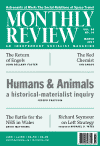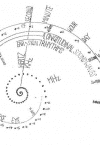Volume 68, Issue 10 (March 2017)

U.S. economic, military, and financial dominance have been ebbing for decades, leaving the United States in the position of a wounded mastodon within the world at large, a threat to all around it. Washington has repeatedly tried with very limited success to reverse this slide in its hegemonic role by means of geopolitical expansion, aimed at increasing its “strategic assets” across the globe. The result has been a constantly expanding theatre of global conflict. | more…

A Historical-Materialist Inquiry into the 'Human and Animal'
The anthropocentric tendency to view nature or the environment as everything that is not human obscures the productive processes that go on in “nature.” But non-human animals are also the purposeful producers of their own worlds: they too engage in their own species-specific objectifying activity that transforms what is, from their perspective, nature; they too build worlds in their own bodily image. | more…

Richard Seymour interviewed by Michael D. Yates
There is a degree of unpredictability in politics today that presents opportunities for those who aren’t too constrained by past experience to see them. We’re seeing the possibility of regenerating a left that has previously been ground down to the scale of atoms, one that, if it adapts creatively to the coming defeats, can prepare the ground for success. But that means recognizing that the history of the left is a history of defeats; it is a history of the vanquished. | more…
England, Wales, and the Socialist Vision
England and Wales represent two very different, indeed incompatible, approaches to health care. In the former, health care has come under increasing threat from the predatory forces of privatization. In Wales, however, an explicit effort has been made to defend socialist values and formulate them for the twenty-first century, defending and expanding a system that puts the health and well-being of its citizens over profit. | more…

The Forgotten Legacy of Carl Schorlemmer
Most accounts of Marx and Engels’s lives, if they mention Carl Schorlemmer (1834–92) at all, refer to the renowned chemist only as a friend, without acknowledging his influence on their studies of the natural sciences. It is time to restore this neglected figure to his rightful place in the Marxian—and Engelsian—tradition. | more…

For decades, academics have suggested that Engels downgraded and distorted Marx’s thought. Today we are at last seeing the return of Engels, whose work continues to inform the struggles and inspire the hopes that define our own time. | more…

The Social Relations of Space Travel
As astronauts penetrate ever further into the cosmos, how are their bodies and subjectivities being transformed? While space travel remains governed by mechanisms of power and domination that tend to treat astronauts as tools, the practice of “space medicine” is now beginning to interact with astronauts’ bodies in a more multidirectional, dialectical fashion. | more…

Ahmed White’s vivid and deeply researched account of the Little Steel strike of 1937 makes an important contribution to our understanding of U.S. labor history, union organizing, and class conflict. It illustrates the tactical complexity of strikes, reveals the power and ruthlessness of employers, and demonstrates the risks of relying on the state to secure justice for working people. | more…






